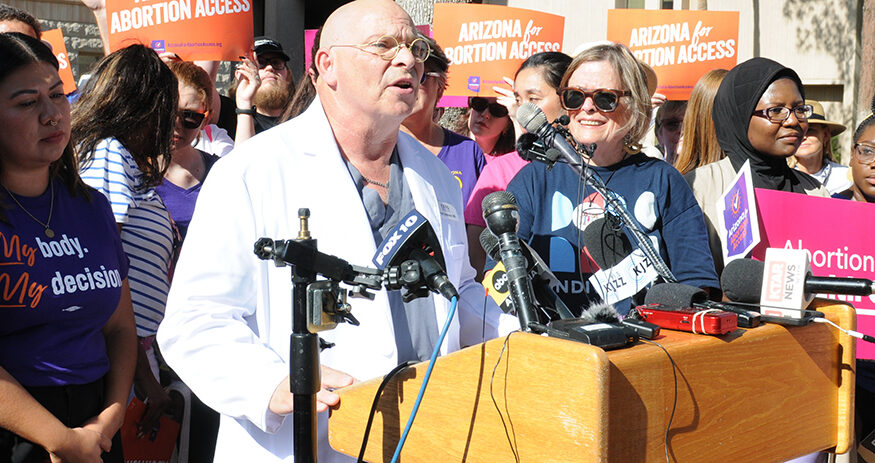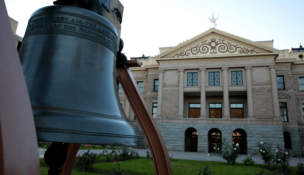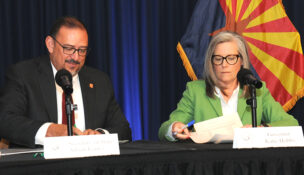Justices OK ‘unborn human being’ in abortion measure
Kiera Riley Arizona Capitol Times//August 14, 2024//[read_meter]
Justices OK ‘unborn human being’ in abortion measure
Kiera Riley Arizona Capitol Times//August 14, 2024//[read_meter]
The phrase “unborn human being” can stay in the Legislative Council’s analysis of Proposition 139, the Arizona Supreme Court ruled Aug. 14.
The court found the language “substantially complies” with a state law requiring analyses included in the state’s publicity pamphlet to be impartial, reversing an earlier ruling from Maricopa County Superior Court.
Following the ruling, Dawn Penich, a spokesperson for Arizona for Abortion Access, said the ruling “means that Arizona voters won’t get to learn about the questions on their ballot in a fair, neutral, and accurate way but will instead be subjected to biased, politically-charged words developed not by experts but by anti-abortion special interests to manipulate voters and spread misinformation.”
She added the group was “deeply disappointed in the ruling, but will not be deterred from doing everything in our power to communicate to voters the truth of the Arizona Abortion Access Act and why it’s critical to vote YES to restore and protect access to abortion care this fall.”
House Speaker Ben Toma, chairman of the Legislative Council, said in a written statement to Arizona Capitol Times the court’s ruling was “correct.”
“The ballot analysis prepared by the Legislative Council is intended to help voters understand current law. Arizona’s 15-week law protects unborn children, while the abortion initiative essentially allows unrestricted abortions up until birth,” Toma said. “It’s really that simple.”
Senate President Warren Petersen added, “Common sense and good judgment prevailed.”
In July, the council presented a draft analysis of the Arizona Abortion Access Act, which states that current law prohibits abortion if the gestational age of the “unborn human being” is more than 15 weeks.
In describing the measure in later paragraphs, the analysis instead uses the word “fetus.”
Despite pushback, the Republican members of the Legislative Council adopted the draft analysis.
Arizona for Abortion Access then sued the Legislative Council for violation of a state law requiring analyses of ballot measures to be “impartial” and claimed terms like “unborn human being” are politically and emotionally charged.
Republican members of the Legislative Council pointed to the cited state law, which uses “unborn human being” and contended the phrase must be neutral due to its inclusion in statute.
Though Maricopa County Superior Court Judge Christopher Whitten noted the statute does use “unborn human being,” he was “not persuaded that every word chosen by the Legislature in every statute it enacts is intended to be neutral in character. There is no requirement that the Legislature chose its words in such a way, and plenty of evidence that they sometimes do not.”
Whitten, an appointee of the former Gov. Janet Napolitano, wrote, “The term ‘unborn human being’ is packed with emotional and partisan meaning, both for those who oppose abortion and for those who endorse a woman’s right to choose whether to have an abortion,” and entered an order requiring the Legislative Council to strike “unborn human being” from the description.
The Legislative Council then appealed to the Arizona Supreme Court, again noting the phrase’s presence in existing state law.
Arizona for Abortion Access argued the language, both in state statute and in the analysis, were still partial.
In a 5-2 ruling, the state high court sided with the legislative council majority and issued an order allowing “unborn human being” to remain in the ballot analysis.
Justice Clint Bolick recused himself from the matter, given his spouse, Shawnna Bolick, is one of the legislative council members. Former Justice John Pelander took Bolick’s place on the bench.
Arizona for Abortion Access asked Justice William Montgomery to recuse himself, given past anti-abortion comments, but he declined.


















